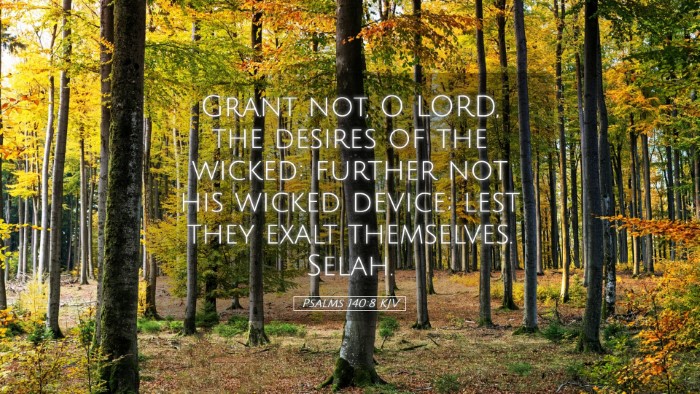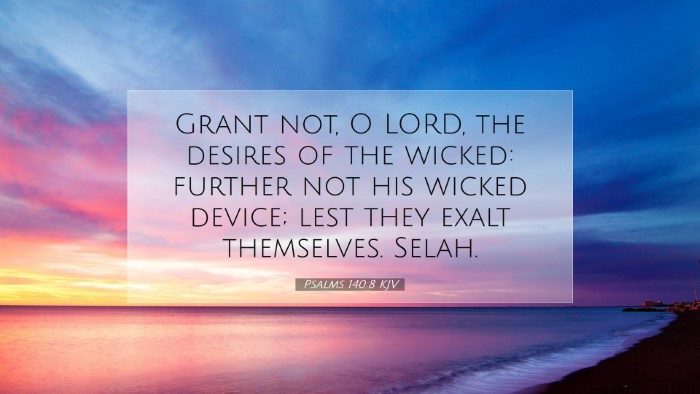Psalms 140:8 – A Commentary Synthesis
Verse: "Grant not, O Lord, the desires of the wicked: further not his wicked device, lest they exalt themselves." (Psalms 140:8)
Introduction
Psalms 140 is a prayer of David, which showcases his dependence on God amidst the threats posed by the wicked. In verse 8, David makes a profound request to God, addressing the dangers of unchecked wickedness. This commentary seeks to elucidate the depth of this verse, drawing insights from notable public domain sources such as Matthew Henry, Albert Barnes, and Adam Clarke.
Contextual Background
The psalm is categorized under the imprecatory psalms, where the psalmist invokes divine judgment against his adversaries. Understanding the context of such a plea is paramount. The prayers express both a personal grievance and a universal appeal against injustice, portraying a deep yearning for divine intervention.
Verse Analysis
Desires of the Wicked
The term "desires" refers to the intentions and longings of those who oppose God's ways. Matthew Henry highlights that the psalmist is pleading for divine restraint on the ambitions of the wicked. The wicked often seek power and influence to execute their agendas, and it is crucial for believers to be vigilant against such desires.
The Nature of God's Intervention
David’s petition is for God not to grant the wicked their desires. Albert Barnes comments that this is a recognition of God’s sovereignty. God’s active will is necessary to prevent the triumph of evil. Herein lies a theological assertion: God’s interventions shape the course of human affairs, a point echoed in other scripts where divine providence is pivotal.
Furthering Wicked Devices
The phrase "further not his wicked device" indicates the psalmist's understanding that the wicked often devise schemes against the righteous. Adam Clarke remarks that this affirms a belief in the power of God to thwart evil plans. The idea that God can intervene to prevent the realization of malevolent intentions reassures the faithful of His protection.
Implications of Exalting the Wicked
The final part of the verse, "lest they exalt themselves," encapsulates a profound moral warning. Henry explains that when wicked individuals succeed, they often elevate their status, becoming arrogant and bold in their defiance of God. This exalting leads not just to personal pride but also to a broader social impact, influencing others to follow in their evil ways.
Theological Reflections
This verse invites deeper theological reflection on several themes: the nature of evil, divine sovereignty, and human responsibility. The prayer not only seeks personal relief but serves as a corporate lament for all who face oppression.
The Nature of Evil
The presence of wickedness is a significant theme throughout the Psalms. The acknowledgment of this reality positions the believer to be vigilant in prayer and action against corrupt influences. The text raises questions about human nature and the propensity toward evil, a paradox explored by many theological scholars.
Divine Sovereignty and Human Affairs
The psalmist's appeal emphasizes the belief that God is actively involved in the affairs of humanity. There is an assurance in the cries for help; it acknowledges that, ultimately, God holds authority over creation, which bridges the divine with human experience.
Encouragement for Believers
For pastors and theologians, this verse serves as a reminder of the importance of prayer in confronting wickedness. It underscores a proactive faith that does not simply lament the presence of evil but actively engages God for protection and justice. As believers, the community can come together in prayerful assertion against social injustices.
Lessons and Applications
- Awareness of Evil: Believers are called to be aware of evil in the world and its effects on society.
- Prayer as a Weapon: The importance of prayer against evildoers is a central theme; the faithful are urged to engage in intercessory prayer.
- Confidence in God's Sovereignty: Assurance that God can and does intervene in human affairs provides hope; this warrants teaching and encouragement within congregations.
- The Call to Humility: Recognizing that any elevation of personal pride should be shunned, seeing that true greatness comes from God alone.
Conclusion
Psalms 140:8 encapsulates a powerful plea for justice and divine intervention in a world rife with evil. By borrowing insights from classical commentaries, we gain a richer understanding of the biblical text and its implications for faith and practice today. As we reflect on this verse, let us commit to being fervent in prayer, vigilant against wickedness, and trusting in God's overarching plan for justice and righteousness.


